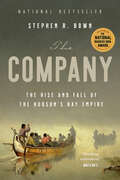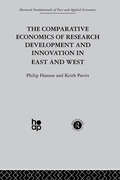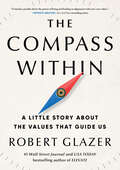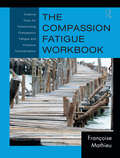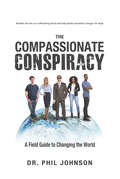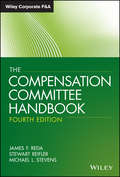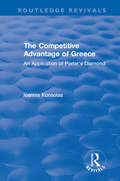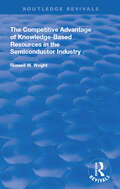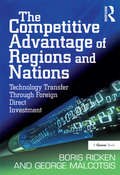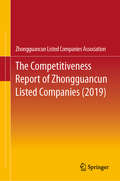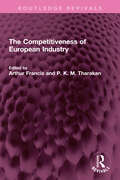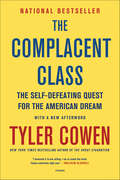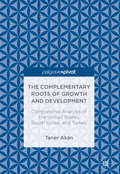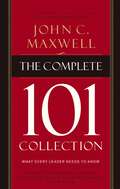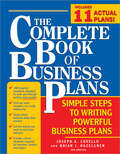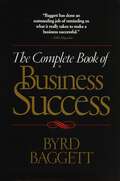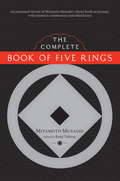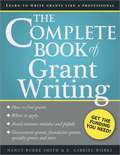- Table View
- List View
The Company of the Future: Maintaining the Health of a Living Company
by Arie De GeusThis chapter discusses why, in the shrinking world, companies conceived of as purely economic risk becoming an endangered species, while living companies have the opportunity to thrive.
The Company: The Rise and Fall of the Hudson's Bay Empire
by Stephen BownA thrilling new telling of the story of modern Canada's origins.The story of the Hudson's Bay Company, dramatic and adventurous and complex, is the story of modern Canada's creation. And yet it hasn't been told in a book for over thirty years, and never in such depth and vivid detail as in Stephen R. Bown's exciting new telling. The Company started out small in 1670, trading practical manufactured goods for furs with the Indigenous inhabitants of inland subarctic Canada. Controlled by a handful of English aristocrats, it expanded into a powerful political force that ruled the lives of many thousands of people--from the lowlands south and west of Hudson Bay, to the tundra, the great plains, the Rocky Mountains and the Pacific northwest. It transformed the culture and economy of many Indigenous groups and ended up as the most important political and economic force in northern and western North America.When the Company was faced with competition from French traders in the 1780s, the result was a bloody corporate battle, the coming of Governor George Simpson--one of the greatest villains in Canadian history--and the Company assuming political control and ruthless dominance. By the time its monopoly was rescinded after two hundred years, the Hudson's Bay Company had reworked the entire northern North American world.Stephen R. Bown has a scholar's profound knowledge and understanding of the Company's history, but wears his learning lightly in a narrative as compelling, and rich in well-drawn characters, as a page-turning novel.
The Comparative Economics of Research Development and Innovation in East and West (Harwood Fundamentals Of Pure And Applied Economics Ser.)
by Professor Philip Hanson P. Hanson K. PavittA systematic comparison of the institutions and incentive systems governing the processes of technological invention, innovation and diffusion in advanced market and centrally planned economies.
The Compass Within: A Little Story About the Values That Guide Us
by Robert GlazerDiscover your core values and find your place in life, love, and work.We all want to be our most authentic selves in every space that we are in—in our relationships, our work, and our communities. But often we feel a disconnect, a tension between who we are and what the people around us expect from us.How do we find authenticity and fulfillment in every area of our lives?This is the question at the heart of The Compass Within. In this enlightening workplace parable, Jamie Hynes is a high achieving, early-career manager trying to reconcile his career ambitions with the ethically murky situations his new boss keeps putting him in. Jamie and his new fiancée are also busy making plans for their wedding, facing new decisions everyday about where they'll live and how they'll make a life together in a community where Jamie feels increasingly out of place.When a member of Jamie's Emerging Sales & Marketing Leaders forum shares how her life was transformed when she got clear on her values, Jamie takes notice—and soon finds himself meeting with Jack Reardon, the forward-thinking CEO of Compass Media. Jack mentors Jamie in a holistic process to discover his "core values" and align his life to them, prompting him to start making changes and ultimately find the job, partner, and community that will allow him to be his truest, most authentic self.The process that Jamie learns is a model for all of us to be more deeply connected to the values and principles we care about, gently guiding us in making the tough calls that are sometimes necessary in order to find happiness in every area of our lives. If you've been feeling stuck, The Compass Within is the comprehensive roadmap you need to greater clarity and courage in life, love, and work.
The Compassion Fatigue Workbook: Creative Tools for Transforming Compassion Fatigue and Vicarious Traumatization (Psychosocial Stress Series)
by Françoise MathieuThe Compassion Fatigue Workbook is a lifeline for any helping professional facing the physical and emotional exhaustion that can shadow work in the helping professions. Since 2001 the activities in this Workbook have helped thousands of helpers in the fields of healthcare, community mental health, correctional services, education, and the military. In addition to a comprehensive description of compassion fatigue and vicarious traumatization, The Compassion Fatigue Workbook leads the reader through experiential activities designed to target specific areas in their personal and professional lives. It provides concrete strategies to help the reader develop a personalized plan for identifying and transforming compassion fatigue and vicarious traumatization. Topics covered include: understanding compassion fatigue and vicarious trauma symptom checklist targeting areas for strategic planning understanding warning signs assessing contributing factors evaluating self-care identifying triggers solutions: personal, professional and organizational strategies.
The Compassionate Achiever: How Helping Others Fuels Success
by Christopher L. KukkA powerful, practical guide for cultivating compassion—the scientifically proven foundation for personal achievement and success at work, at home, and in the community.For decades, we’ve been told the key to prosperity is to look out for number one. But recent science shows that to achieve durable success, we need to be more than just achievers; we need to be compassionate achievers.New research in biology, neuroscience, and economics have found that compassion—recognizing a problem or caring about another’s pain and making a commitment to help—not only improves others’ lives; it can transform our own. Based on the most recent studies from a wide range of fields, The Compassionate Achiever reveals the profound benefits of practicing compassion including more constructive relationships, improved intelligence, and increased resiliency. To help us achieve these benefits, Christopher L. Kukk, the founding Director of the Center for Compassion, Creativity and Innovation, shares his unique 4-step program for cultivating compassion. Kukk makes clear that practicing compassion isn’t about being a martyr or a paragon of virtue; it’s about rejecting rage and indifference and choosing instead to be a thoughtful, caring problem-solver. He identifies the skills every compassionate achiever should master—listening, understanding, connecting, and acting—and outlines how to develop each, with clear explanations, easy-to-implement strategies, actionable exercises, and real-world examples. With the The Compassionate Achiever everyone wins—we can each achieve success in our own lives and create more productive workplaces, and healthier, less violent communities.
The Compassionate Conspiracy: A Field Guide to Changing the World
by Philip JohnsonAs the world around us gasps for breath in an environment of unprecedented complexity and need, we find ourselves overwhelmed and asking is there anything we can do to make a difference? The Compassionate Conspiracy answers with a resounding Yes and serves as a practical guide to help readers discover their passion and develop their personal plan to make a world of difference.
The Compensation Committee Handbook
by James F. Reda Stewart Reifler Michael L. StevensNew and updated information on the laws and regulations affecting executive compensationNow in a thoroughly updated Fourth Edition, The Compensation Committee Handbookprovides a comprehensive review of the complex issues challenging compensation committees that facerevised executive compensation disclosure regulations issued by the SEC, as well as GAAP andIFRS rulings and trends. This new and updated edition addresses a full range of functionalissues facing compensation committees, including organizing, planning, and best practicestips.Looks at the latest regulations impacting executive compensation, including new regulationsissued by the SEC, as well as GAAP and IFRS rulings and trendsCovers the selection and training of compensation committee membersExplores how to make compensation committees a performance driver for a companyGuides documentation requirements and timing issuesThe Compensation Committee Handbook, Fourth Edition will help all compensationcommittee members and interested professionals succeed in melding highly complex technical informationand concepts with both corporate governance principles and sound business judgment.
The Competitive Advantage of Emerging Market Multinationals
by Afonso Fleury Maria Tereza Leme Fleury Peter J. Williamson Ravi RamamurtiMultinationals from Brazil, Russia, India and China, known as the BRIC countries, are a new and powerful force in global competition and are challenging the incumbency of much older global companies from the developed world. Emerging market multinational enterprises (EMNEs) now account for a quarter of foreign investment in the world, are a prolific source of innovation and make almost one in three cross-border acquisitions globally. Despite this, traditional theories of international business do not provide a satisfactory explanation of their behaviour or performance. The authors of this book shine new light on the rise of the EMNEs and how they have built a competitive advantage through innovation, novel configurations of their international value chains and the acquisition of companies overseas. Any manager, policy maker or researcher who wishes to understand the emergence of this new breed of multinational will find this book an invaluable resource.
The Competitive Advantage of Greece: An Application of Porter's Diamond (Routledge Revivals)
by Ioannis KonsolasThis title was first published in 2002: This compelling text is the first major application of Michael Porter's diamond framework to identify the sources of national competitive advantage in the case of Greece. Offering a useful evaluation of Porter's theory through an extensive literature review, the book also draws on empirical evidence from five selected Greek industries. It also provides information and commentary on many aspects of the Greek economy, its historical evolution and its current trends. International and Greek investors, international organizations, business consultants and financial institutions will certainly benefit from this analysis of the Greek economic environment. Moreover, universities and researchers will be interested in the evidence supporting or refuting parts of the widely used and cited "diamond" framework.
The Competitive Advantage of Knowledge-Based Resources in the Semiconductor Industry
by Russell W. WrightFirst Published in 1997. Knowledge and knowledge-based resources occupy critical positions in a company’s value chain. The theme of the book is that organizational distinctive competences are asymmetrical accumulations of knowledge-based resources relative to a firm's competitors. These accumulations of knowledge and capabilities enable and constrain a firm's ability to develop competences in specific areas such as new product development. Knowledge and capabilities are sources of competitive advantage to the extent that they are non-transferable and non-imitable The imitability of knowledge-based resources is a function of two conceptually distinct attributes: tacitness and tangibility. This book looks at how the evolution of industry knowledge influences new product strategies in successive product generations of the semiconductor industry. This book also makes some basic distinctions among the types of organizational resources that tend to generate unusual economic returns.
The Competitive Advantage of Nations: Assessing Porter's Framework for National Advantage (Routledge Revivals)
by Özlem ÖzFirst published in 1999, this volume applies Professor Michael Porter’s diamond framework (1990) to the Turkish glass, construction, leather clothes, automobile and flat steel industries. Özlam Öz aims primarily to contribute towards an improvement of this framework, and thus towards a better understanding of the sources of competitive advantage. Her research presents a new approach to evaluate the competitiveness of the Turkish economy, given that alternative studies usually focus on factors like exchange rates and the cost of labour and raw materials as the determinants of competitive advantage. The author begins her book by providing an evaluation of the diamond framework linked to the debate created by the publication of The Competitive Advantage of Nations. She then identifies the pattern of advantage in Turkey by specifying the internationally competitive industries and clusters. This is followed by a detailed examination of the five Turkish industry case studies - glass, construction, leather clothes, automobile and flat steel industries. The findings are generally supportive of Porter. The results suggest, however, several major areas in the framework - especially domestic rivalry and the role of government - where one or more of the Turkish cases question Porter's hypothesises. The book ends with the implications of the study for the sources of competitive advantage in general and for the Turkish economy in particular. Porter and his diamond framework are both unquestionably influential. Improvements upon it forwarded in this book will be of use to academic readers as well as strategic planners and policy makers.
The Competitive Advantage of Regions and Nations: Technology Transfer Through Foreign Direct Investment
by Boris Ricken George MalcotsisThe importance of technology transfer for the competitive advantage of companies and the economic success of nations cannot be overstated. Technology is a determining element for firms and nations to increase productivity, to compete, and to prosper. In The Competitive Advantage of Regions and Nations, the authors stress that companies, investment promotion agencies, and government bodies cannot simply sit and wait until new technologies arrive in their domain. Rather, they need to manage the identification, assessment, attraction, absorption and application of new technologies. In this comprehensive book, Boris Ricken and George Malcotsis explain how technology transfer in Foreign Direct Investment (FDI) projects can be systematically managed. Using some 40 case studies as illustration, they give step-by-step guidance for managers. The explanation of theory in this book, together with the frameworks and cases delivering solutions to the various challenges of technology transfer will be highly appreciated by managers of companies, investment promotion agencies, and government bodies alike. It also offers students confronted with the topic an understandable study guide.
The Competitiveness Report of Zhongguancun Listed Companies (2018)
by Zhongguancun ListedThis book addresses the fundamental development status and provides the systematic analysis of Zhongguancun Listed Companies, from different perspectives of financial statistics, comparisons among different regions and company structures. Zhongguancun, the origin and the representative of Chinese modern innovation, has collected over 300 Listed Companies so far. The book also offers an illustration that how Zhongguancun Listed Companies developed in 2017, including the market performance, the profitability, the debt paying capacity, the conditions of operating, innovation, investing and dominant industries, with the proposal of the existing difficulties and developing suggestions in depth. The book aims at objectively presenting the competitiveness characteristics and development status of Zhongguancun Listed Companies. Whether you're a global investor, an economic researcher, or ordinary people, this book will be an important way to understand China's scientific and technological innovation achievements and Zhongguancun outstanding enterprises.
The Competitiveness Report of Zhongguancun Listed Companies (2019)
by Zhongguancun Listed Companies AssociationThis book is based on the comprehensive grasp and analysis of the financial data of ZLCs and In-depth observations by ZLCA for many years. This book will objectively present the capital market distribution, overall scale, profitability, innovation ability and social contribution of ZLCs from multiple dimensions, and carry out thematic analysis and research on the high proportion of accounts receivable to current assets in ZLCs in recent years, aiming at objectively presenting their competitive strength and development status. Whether you are an investor, an economic researcher or the general public interested in Z-Park, this book will be an important way for you to understand the latest development of Z-Park and the high-quality listed companies in Z-Park.
The Competitiveness Report of Zhongguancun Listed Companies (Current Chinese Economic Report Series)
by Zhongguancun Listed Companies AssociationThis book focuses on the comprehensive grasp and analysis of the financial data of ZLCs in 2020 and in-depth observations by ZLCA for many years. This book objectively presents the capital market distribution, overall scale, profitability, innovation ability and social contribution of ZLCs from multiple dimensions and carries out thematic analysis and research on the high proportion of accounts receivable to current assets in ZLCs in recent years, aiming at objectively presenting their competitive strength and development status. Whether you are an investor, an economic researcher or the general public interested in Z-Park, this book is an important way for you to understand the latest development of Z-Park and the high-quality listed companies in Z-Park.
The Competitiveness Report of Zhongguancun Listed Companies (Current Chinese Economic Report Series)
by Zhongguancun Listed Companies AssociationThis book is based on the comprehensive grasp and analysis of the financial data of Zhongguancun listed companies (ZLCs), and in-depth observations by ZLCA for many years. This book presents the capital market distribution, overall scale, profitability, innovation ability and social contribution of ZLCs in multiple dimensions, and carris out thematic analysis and research of the high proportion of accounts receivable to current assets in ZLCs in recent years, aiming at objectively presenting their competitive strength and development. Whether investors, researchers or reporters who are interested in Z-Park, this book is an important reference to better understand the latest development of Z-Park and the high-quality listed companies in Z-Park.
The Competitiveness of European Industry (Routledge Revivals)
by Arthur Francis P. K. M. TharakanFirst published in 1989, The Competitiveness of European Industry helps in developing our understanding of the process of improving and measuring industrial competitiveness. The contributors focus on the competitiveness of European industry. Three main topics are discussed: the concept of competitiveness itself; what can be learned about competitiveness at the level of an individual national economy; and processes and strategies in forms which might contribute to improved competitive performance. The first two papers critically assess concepts and measures of national competitiveness and review the performances of the economies of Britain, France, and the Federal German Republic. Then follow accounts of industrial competitiveness in three smaller economies (Belgium, Switzerland, and Sweden), which develop a series of methods and techniques for the analysis of industrial structures and indicate significant policy implications. The three concluding papers look at the competitiveness of British industry at the firm level, focusing on the strategic changes, the competitive process, and technical innovation. This book will be of interest to policy makers, business school teachers, and researchers in the area of strategy, industrial economics, organization behaviour, and innovation management.
The Complacent Class: The Self-Defeating Quest for the American Dream
by Tyler CowenA Wall Street Journal and Washington Post Bestseller"Tyler Cowen's blog, Marginal Revolution, is the first thing I read every morning. And his brilliant new book, The Complacent Class, has been on my nightstand after I devoured it in one sitting. I am at round-the-clock Cowen saturation right now."--Malcolm Gladwell Since Alexis de Tocqueville, restlessness has been accepted as a signature American trait. Our willingness to move, take risks, and adapt to change have produced a dynamic economy and a tradition of innovation from Ben Franklin to Steve Jobs.The problem, according to legendary blogger, economist and best selling author Tyler Cowen, is that Americans today have broken from this tradition—we’re working harder than ever to avoid change. We're moving residences less, marrying people more like ourselves and choosing our music and our mates based on algorithms that wall us off from anything that might be too new or too different. Match.com matches us in love. Spotify and Pandora match us in music. Facebook matches us to just about everything else.Of course, this “matching culture” brings tremendous positives: music we like, partners who make us happy, neighbors who want the same things. We’re more comfortable. But, according to Cowen, there are significant collateral downsides attending this comfort, among them heightened inequality and segregation and decreased incentives to innovate and create.The Complacent Class argues that this cannot go on forever. We are postponing change, due to our near-sightedness and extreme desire for comfort, but ultimately this will make change, when it comes, harder. The forces unleashed by the Great Stagnation will eventually lead to a major fiscal and budgetary crisis: impossibly expensive rentals for our most attractive cities, worsening of residential segregation, and a decline in our work ethic. The only way to avoid this difficult future is for Americans to force themselves out of their comfortable slumber—to embrace their restless tradition again.
The Complementary Roots of Growth and Development: Comparative Analysis of the United States, South Korea, and Turkey
by Taner AkanThe common roots of success and failure in economic growth and development lie in the systemic governance and fragmentation of institutional complementarities, respectively, but not in the unilateral adaptation of market-led or state-led models. To substantiate this argument, Akan utilizes case countries from the United States, South Korea, and Turkey—an advanced developed, a recently developed, and a developing country. Akan provides a simple framework for understanding two points that go beyond ideological obsession. The first is how a model of G&D works and evolves; with its economic, financial, industrial, and political dynamics intertwining. The second is why a market-led or state-led model succeeds and fails in both developed and developing countries.
The Complete 101 Collection: What Every Leader Needs to Know
by John C. MaxwellNow in one paperback volume, John C. Maxwell's best-selling 101 series of briefcase-sized leadership books that have helped more than one million people become better leaders. The Complete 101 Collection includes material that in true Maxwell style helps readers reach their potential at any stage in their career. It can be thought of as a crash course in leadership, a practical tool to sharpen the core fundamentals every professional needs. Contents include a 101 on attitude, self-improvement, leadership, relationships, success, teamwork, equipping, and mentoring. Each 101 book is an introduction to a subject, not the "advanced course." This concentrated collection of books helps readers on their way to significant growth in specific areas of their lives.
The Complete Book of Business Plans: Simple Steps to Writing Powerful Business Plans (Complete Book of)
by Joseph Covello Brian HazelgrenReaders have turned to The Complete Book of Business Plans for almost 10 years for advice and information, making it one of the bestselling business planning books of our time.Authors Brian Hazelgren and Joseph Covello have gone back to the drawing board on this updated edition, providing you with more than a dozen brand-new business plans that will help you attract the financing and investment you need. The Complete Book of Business Plans also includes revised and updated information on how to get started, what questions to ask and how to finalize a business plan that will get you off the ground and running.For business owners just starting out or seasoned veterans that want to bring their business to the next level, The Complete Book of Business Plans is the only reference they need to get the funding they're looking for.
The Complete Book of Business Success
by Byrd BaggettLeadership. Sales. Customer service. Mastering these willgo a long way towards making sure a business is successful. Byrd Baggett hasprovided easy-to-put-into-practice guidelines in his three best selling books: Taking Charge, The Book of Excellence, and Satisfaction Guaranteed. These three books are now combined into one attractivelypackaged book.
The Complete Book of Five Rings
by Miyamoto Musashi Kenji TokitsuThe Complete Book of Five Rings is an authoritative version of Musashi's classic The Book of Five Rings, translated and annotated by a modern martial arts master, Kenji Tokitsu. Tokitsu has spent most of his life researching the legendary samurai swordsman and his works, and in this book he illuminates this seminal text, along with several other works by Musashi. These include "The Mirror of the Way of Strategy," which Musashi wrote when he was in his twenties; "Thirty-five Instructions on Strategy," and "Forty-two Instructions on Strategy," which were precursors to The Book of Five Rings; and "The Way to Be Followed Alone," which Musashi wrote just days before his death. Read together, these five texts give readers an unusually detailed, nuanced view of Musashi's ideas on swordsmanship, strategy, and self-cultivation. Tokitsu puts all these writings into historical and philosophical context and makes them accessible and relevant to today's readers and martial arts students. Tokitsu understands Musashi's writings--and Musashi as a martial artist--unusually well and is able to provide a rare insight into the man and his historical contribution.
The Complete Book of Grant Writing
by Nancy Burke Smith E. Gabriel WorksGet the funding you need! Grant writing is an intricate process, and any bits of misinformation or formatting errors can be the deciding factors when it comes to allotting money. The Complete Book if Grant Writing is a must-have reference if you're seeking funding through grants-government grants, foundation grants, specialty grants, and more. Professional grant writer Nancy Burke Smith and philanthropy consultant and grant maker e. Gabriel Works unveil the secrets behind how to find and successfully apply for grants. The Complete Book of Grant Writing includes information on: *The Five Core Components of every grant, including the statement of need, the evaluation plan, and budgets * What makes a grant compelling to funders? What to do when you are funded-and what you can do when you are not *How to be a professional grant writer *The grant writing timetable, from responding to requests for proposals to receiving funding *Grant writing in different fields of nonprofit practice, including educational, governmental, environmental, and faith-based organizations Packed with 20 samples including grant proposals, letters of inquiry, support letters, concept papers and more!

